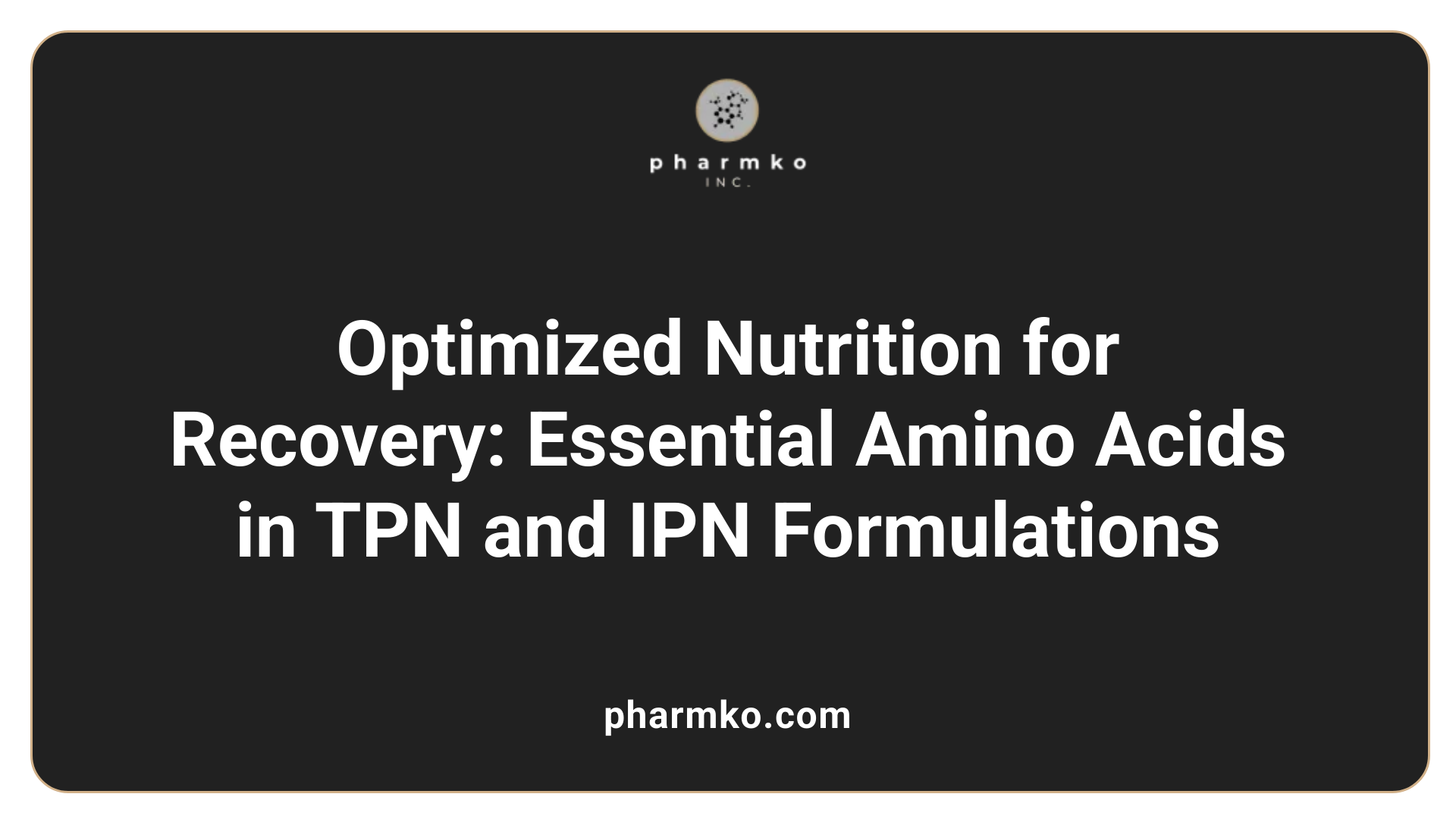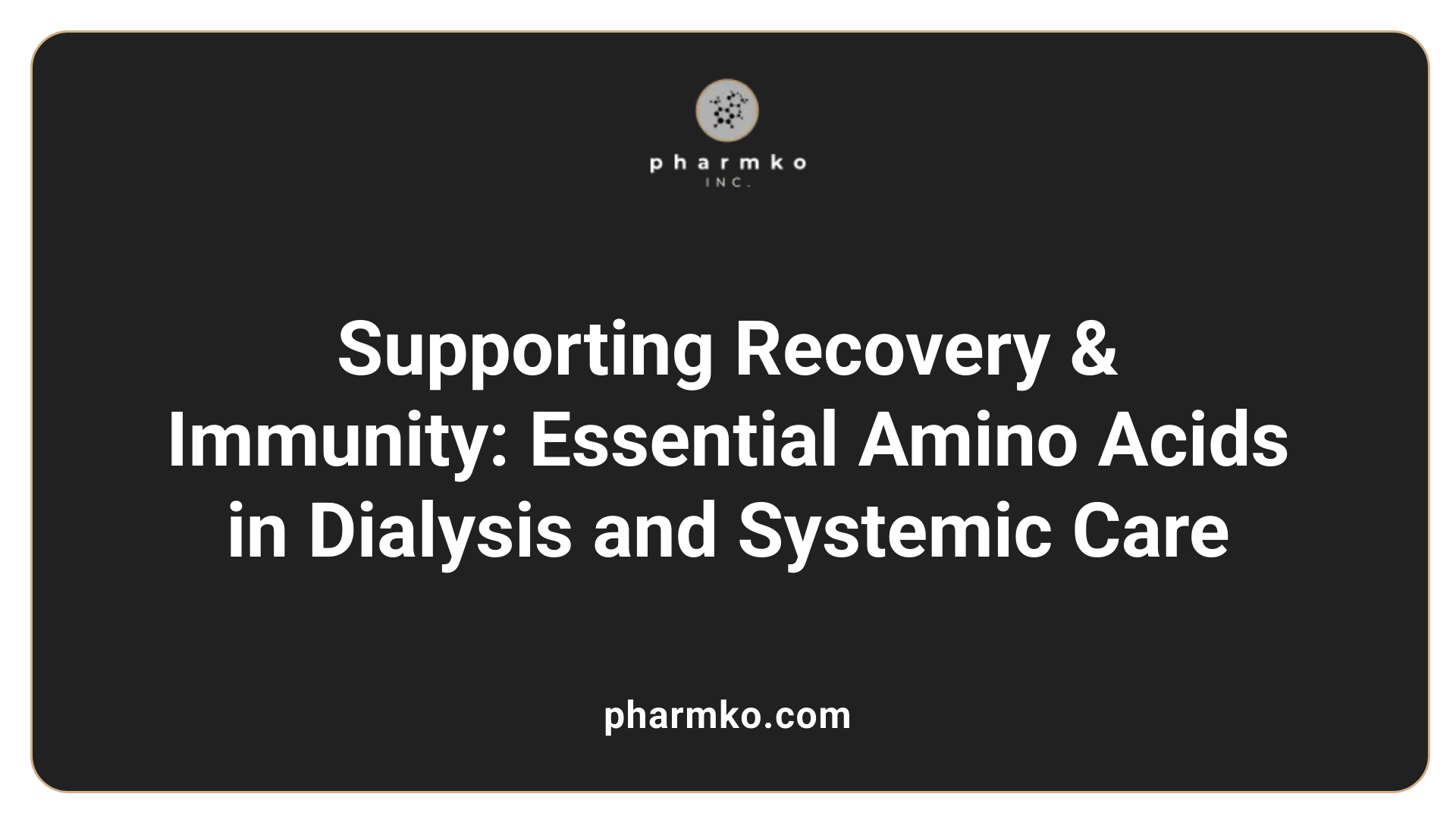Essential amino acids in IPN
Understanding the Critical Role of Essential Amino Acids in Intraperitoneal Nutrition
Intraperitoneal nutrition (IPN) is a specialized therapeutic approach aimed at addressing the nutritional deficits faced by patients undergoing long-term dialysis. The process involves supplementing the peritoneal dialysate with essential nutrients, notably amino acids, to counteract significant losses and maintain optimal health. This article explores the importance, application, and scientific basis of essential amino acids in IPN, highlighting their critical functions in supporting growth, immune response, and systemic health in dialysis patients and other vulnerable populations.
What are Essential Amino Acids and Their Significance in Nutrition

What are essential amino acids, and why are they important in nutrition and medical treatments?
Essential amino acids are a group of nine amino acids that the human body cannot produce on its own. Therefore, they must be acquired through diet. These amino acids include histidine, isoleucine, leucine, lysine, methionine, phenylalanine, threonine, tryptophan, and valine.
Since the body cannot synthesize these amino acids, consuming enough of them is crucial for maintaining good health. They play vital roles in building proteins, repairing tissues, supporting immune functions, and producing hormones and neurotransmitters.
In clinical nutrition, especially for patients with increased needs or recovery requirements, complete proteins that provide all nine essential amino acids are especially important. Dietary sources are primarily animal proteins such as meat, dairy, and eggs, but some plant foods like quinoa and soy also contain all essential amino acids.
Getting the right balance of these amino acids supports growth, prevents deficiency-related problems like muscle loss, immune decline, and growth retardation, and promotes overall metabolic health. Proper intake is fundamental for maintaining muscle mass, wound healing, and the synthesis of important biological molecules.
In summary, essential amino acids are fundamental building blocks for life, indispensible in medicine and everyday nutrition to ensure the body's growth, repair, and overall functioning.
Inclusion of Essential Amino Acids in TPN and IPN Formulations

What are the key amino acids included in total parenteral nutrition (TPN) formulations?
In TPN formulations, the amino acids provided are primarily the nine essential amino acids that the human body cannot synthesize. These include histidine, isoleucine, leucine, lysine, methionine, phenylalanine, threonine, tryptophan, and valine. These amino acids are critical for protein synthesis, growth, and repair.
Alongside these essential amino acids, TPN solutions often contain non-essential amino acids such as alanine, asparagine, aspartate, glutamate, glutamine, glycine, proline, and serine. These support various metabolic processes and help maintain nitrogen balance.
Some amino acids like cysteine and tyrosine are considered intermediate because their synthesis in the body depends on other amino acids—methionine and phenylalanine, respectively. Including these in TPN requires careful consideration due to their solubility and stability issues.
Commercial amino acid solutions for TPN are typically a balanced mixture of essential and non-essential amino acids. These mixes can be tailored for specific patients, such as those with hepatic or renal impairments, to optimize clinical outcomes.
Overall, TPN formulations aim to deliver sufficient amino acids and proteins necessary for growth and recovery, with adjustments based on the patient’s age, condition, and specific nutritional needs.
Critical Roles of Amino Acids in Human Growth and Health

What amino acids are critical for human growth and health, and how do they function?
Human health relies heavily on essential amino acids, which are compounds the body cannot produce on its own and must be obtained through diet. There are nine such amino acids: histidine, isoleucine, leucine, lysine, methionine, phenylalanine, threonine, tryptophan, and valine.
These amino acids are fundamental to many biological processes. They are building blocks for proteins, which are crucial for tissue growth, repair, and maintenance. For instance, lysine plays a vital role in collagen formation, important for skin, bones, and connective tissues, and aids calcium absorption. Phenylalanine serves as a precursor to neurotransmitters like dopamine and norepinephrine, supporting mood regulation and cognitive functions.
Adequate intake of these nutrients supports immune function, hormone production, and metabolic regulation. They help maintain muscle mass, support growth during childhood and adolescence, and assist recovery from illness or injury.
A diet rich in diverse protein sources—including meats, dairy products, eggs, legumes, and nuts—ensures sufficient provision of essential amino acids. Conversely, deficiencies can cause serious health problems. Without enough amino acids, individuals may experience stunted growth, weakened immune defenses, mood disorders, and impaired wound healing.
Overall, these amino acids are indispensable for sustaining human health, making their adequate consumption through balanced nutrition vital for growth, development, and disease prevention.
Application of Essential Amino Acids in Dialysis and Systemic Health

How do essential amino acids support muscle recovery and immune function?
Essential amino acids (EAAs) are indispensable components needed for building proteins, repairing tissues, and maintaining overall health. They play an especially important role in supporting muscle recovery, which is vital for patients recovering from illness or injury, as well as in maintaining muscle mass in aging populations.
In individuals undergoing dialysis, nutritional losses include significant amounts of amino acids, especially during treatments like hemodialysis or peritoneal dialysis. For example, per session can lead to a loss of 13-20 grams of amino acids, which can result in muscle wasting and weakened immunity.
Supplementing EAAs helps replenish these losses and supports muscle repair. Use of targeted formulations, such as intradialytic parenteral nutrition (IDPN) and intraperitoneal nutrition (IPN), can be tailored to supply the essential amino acids directly, aiding in the maintenance of nutritional status.
Beyond muscle health, EAAs also bolster immune function. Amino acids like arginine and glutamine become conditionally essential during illness or stress, helping to support immune cell proliferation and tissue repair. This is vital for vulnerable groups such as preterm infants, elderly patients, or those recovering from trauma.
In preterm infants, specialized parenteral nutrition ensures they receive adequate EAAs to support growth and development, which is crucial because most fetal nutrient stores are deposited in the last trimester.
In summary, EAAs support systemic health by facilitating muscle regeneration and strengthening immune defenses, especially in patients with increased nutritional needs. Proper management through diet, supplements, or specialized nutritional therapies ensures these nutrients address specific health challenges and improve recovery outcomes.
Biochemical and Biomedical Role of Amino Acids

What is the role of specific amino acids in medical and biotechnological contexts, such as enzyme activity, disease mechanisms, and biohybrid materials?
Amino acids are fundamental components in the development of many medical and biotechnological innovations. They serve as the building blocks for proteins, which are essential for creating the structural and functional diversity of enzymes, hormones, and cellular components.
In enzyme activity, certain amino acids like selenocysteine are incorporated into catalytic sites, enabling specific biochemical reactions to occur efficiently. Selenocysteine, often called the 21st amino acid, is essential for the function of various antioxidant and redox enzymes. Mutations in amino acid sequences can lead to or influence disease mechanisms; for example, genetic mutations that alter amino acids in critical proteins may result in metabolic disorders or enzymatic deficiencies.
Amino acids are also employed in designing advanced biomedical materials. They enhance drug delivery systems, such as sustained-release formulations, by improving solubility, stability, and compatibility with the human body. Additionally, amino acids act as neurotransmitters and hormones, playing vital roles in regulating physiological processes, including immune responses and metabolic pathways.
In biohybrid systems, amino acids facilitate the development of materials that combine biological and synthetic components, opening new avenues for diagnostics and therapeutics. For example, specific amino acids are used to modify surfaces or create biomimetic materials that interact effectively with biological tissues.
Understanding the specific functions of amino acids in these areas not only deepens our knowledge of biological processes but also drives innovations in treatments, diagnostics, and medical device development. Their versatile roles continue to influence the future of biomedicine and bioengineering.
Ensuring Adequate Amino Acid Supply in IPN for Optimal Patient Care
Intraperitoneal nutrition leverages the critical roles of essential amino acids to enhance the health outcomes of dialysis patients. By carefully formulating IPN with the appropriate amino acid profiles, clinicians can mitigate nutrient loss, promote growth and recovery, and support systemic functions such as immune response and tissue repair. Advances in understanding amino acid functions and their specific requirements continue to refine nutritional therapies, making IPN an integral component of comprehensive patient care. Ensuring that patients receive the right balance of essential amino acids is vital for maintaining metabolic stability, preventing deficiencies, and improving overall quality of life in those with chronic kidney disease and other vulnerable groups.
References
- IDPN & IPN Nutrition Therapy for Dialysis Patients, What's ...
- Biochemistry, Essential Amino Acids - StatPearls
- Current perspectives on IPN for preterm infants
- Intradialytic Parenteral Nutrition Pharmacy
- Amino Acid Requirements for Growth of Nile Tilapia
- Amino Acid: Benefits & Food Sources
- Amino acid residues Leu135 and Tyr236 are required for ...
- Proteinogenic amino acid
- Monthly variation in the chemical composition of Eisenia ...













